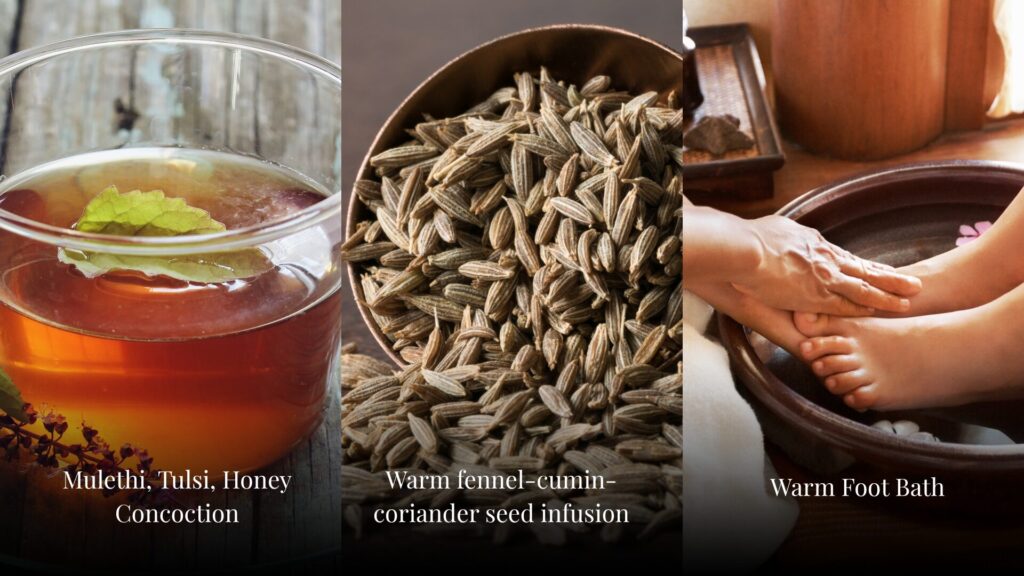Winter months are here and so are the health issues linked to the cold breeze. Needless to say, everything from internal immunity to overall health is compromised and requires special care. Every year, I turn to Ayurvedic natural immunity boosters and winter seasonal wellness secrets to stay warm, strong, and energetic all season long.
In this article, I’ll reveal how I use potent ayurvedic herbs, desi nuskhe, and superfoods for preventive care, seasonal detox, and everyday wellness. (That includes my loved ones too!) My goal is to give you a practical yet effective toolkit of ayurvedic winter wellness strategies, which is exactly what you need to beat the upcoming colder months.
So, if you are looking for handy tips, researched, and tested solutions for ayurvedic natural immunity boosters, seasonal detox, and preventive care, you are in the right place.
Embracing Ayurvedic Preventive Herbs for Winter Health
Although I prefer winters over any other season, I find it difficult to adapt to the climate in the beginning. Hence, I ensure to alter my diet and routine that helps me to beat the winter breeze without falling sick. As I share my top ayurvedic winter wellness tips with all my readers, I request you to pick and choose the ones that suit your body.
1) Tulsi: Tulsi (Ocimum Sanctum) is known to strengthen immunity as it fights infections and keeps the respiratory system cleaned. Not only is Tulsi anti-viral and anti-inflammatory but also keeps winter cold, coughs, and congestion away.
Tulsi is my go-to herb for cold, cough, and flu as it enhances both innate and adaptive immunity.
Usually, I prepare a Tulsi tea for me without sugar and milk and have it early in the morning. Some prefer to chew some tulsi leaves but I find them to affect my teeth. So, I skip chewing them.
2) Turmeric (Haldi): This popular Indian spice is rich in Curcumin, which is not only a natural immunity booster but also shields the body against inflammation and seasonal winter illnesses like flu, cold, and viral. In short, it can fight infection and enhance immune response.
All of you must have tried “Haldi Vala Doodh,” which is considered to be turmeric milk (golden milk) in Ayurveda. I personally love the taste of golden milk and have it before bedtime, which helps me to sleep deeply. One pro tip I want to share with all of you is to add a dash of black pepper to boost absorption. At times, I add raw turmeric to soups, teas, sabzis, and more.
(Note: Overdoing Haldi can be dangerous for the liver, especially people suffering from Hepatitis, reduced or blocked flow of bile and more. Also, it may increase urinary oxalate levels and risk kidney stone formation.)
3) Amla (Indian Gooseberry): Known to be a storehouse of Vitamin C, Amla should be everyone’s go-to superfood for overall immunity. Additionally, Amla helps detoxify the body, get rid of free radicals in the blood stream, and flush out accumulated amas due to high antioxidant properties.
Ayurveda suggests consuming fresh amla, amla murabba, and homemade chutney. However, I prepare amla juice shots and consume it early in the morning on an empty stomach. To make it edible and palatable, I add the concentrated amla juice to a full glass of water.
Several clinical researches prove that amla increases white blood cells to fight seasonal infections by nourishing ojas, clearing of amas, supporting digestion, and immunity. Scientifically, Amla is rich in Polyphenols that support immunity throughout the year.
4) Giloy (The Immunity Elixir): Guduchi or Giloya (Tinospora Cordifolia) is called Amrita in Ayurveda and popular for its blood purification properties and supporting the liver by strengthening resistance to colds, fevers, and flu.
I occasionally take a small decoction of Guduchi stem, where the stem is sourced from my own kitchen garden. If you don’t have one at your home, get it from a trusted source.

5) Ginger (Adrak): Ginger is a potent spice for kindling agni (digestive fire), that has the power to clear the blocked sinus and congestion. This improved circulation is important in winters. Further, some recent studies emphasise ginger’s thermogenic and immune-supporting properties, especially for colds, and respiratory health.
Incorporating Adrak in my lifestyle is the easiest and most convenient thing. All I do is, grate the ginger into my soups, cup of warm tea, tonic waters with lemon and more. Personally, I am a big fan of this pungent strong spice, so I roast a small piece of Adrak on the gas directly and consume it like a toffee during cold season.
However, if your Pitta is already aggravated, then I recommend you to have ginger in moderation as balance is key.
6) Ashwagandha: Known to be a popular Rasayana herb, Ashwagandha for ayurvedic winter wellness not just supports immunity but also boosts stress resiliency. When the days are shorter with lesser sunlight and indoor heating, we tend to feel sluggish, which burdens and slows down the internal system.
Hence, consuming Ashwagandha (Withania Somnifera) has been shown in studies to reduce cortisol (stress hormone), enhance the immune markers, and improve well-being.
In winter, I take a small dose of Ashwagandha powder (about half or one and a half G) with warm milk at night.
7) Cinnamon (Dalchini) & Cardamom: Overall, consuming these spices bring warmth, improve circulation, support digestion and help prevent microbial invaders. Cinnamon and Cardamom has antioxidants, and anti-inflammatory properties.
Therefore, I sprinkle cinnamon into my morning oats breakfast and in tea. You can also soak dalchini overnight and have the water in the morning on an empty stomach. End every meal with chewing a cardamom pod for fresh breath and warmed digestive fire.
My Nani ke Nuskhe for Winter Seasonal Wellness As Per Ayurveda
Some call it “Grandmother’s remedies” but these Nuskhes are totally worth it. Thanks to my nani, I found some remedies that are simple and rooted in Ayurveda. Let’s follow them too.
- Mulethi, Tulsi, Honey Concoction: Believe me when I say it, but this combination fights coughs and congestion. Take 1 part of licorice root pieces, a few tulsi leaves, and boil them. Add a teaspoon of organic honey and sip warm when you feel your throat is getting soared.
The Ayurvedic Logic: Mulethi soothes throat & respiratory tract, tulsi clears Kapha, honey adds nourishment. Personally, I add a pinch of black pepper and ginger for extra warmth.
- Warm fennel-cumin-coriander seed infusion after dinner. You can do that by roasting a mix of saunf, jeera, dhaniya and blending them for brewing. During winter evenings, the temperature falls down to 1 or 2 degrees, so I make a herbal tea and sip it warm after dinner.
The Ayurvedic Logic: This decoction helps in digestion (Agni), clears residual heaviness in the form of aggravated Kapha, warms the gut, and prevents cold-season sluggishness.
- Warm Foot Bath: There is no greater remedy than a good deep sleep of 6 to 8 hours. Before my bedtime, I fill a shallow basin with warm water, add a few drops of mustard oil and some steeped fenugreek seeds for 5 to 10 minutes. As soon as I am done, I clean, moisturise, and put on woollen socks. Please note that I do not recommend you to sleep while wearing socks. Don’t ask for logic, but my nani definitely had.

In Ayurveda, keeping the feet warm and circulation good helps immunity and prevents vata/cold imbalances. Also, it helps in balancing of the doshas, prana flow, and detox of stagnation.
Why this Season Demands Extra Care
In winter, according to Ayurveda, the Kapha dosha tends to accumulate and further cause Vata imbalance too. This leads to heaviness, dryness, roughness, chills, slow digestive fire, and declines circulation.
Scientifically, colder weather often means people stay indoors, don’t get exposed to less sunlight and are prone to viral and bacterial threats. So, when I think of ayurvedic wellness, winter seasonal wellness, I try to work on the following three things –
- Kindle the digestive fire
- Clear the stagnation of accumulated amas and kapha
- Boost immunity
What To Keep In Mind for Winter Seasonal Wellness
- These ayurvedic wellness for immunity options during winters are not a magic bullet, as immunity depends on sleep, stress, environment, and underlying health concerns. Herbs can only support but don’t replace these foundations.
- Always source herbs and powders from reliable providers, adulteration, and variable potency is a real concern.
- If you are already a Pitta-dominant body type, you may need to moderate certain warming herbs . Hence, knowing your body type is important.
- Consult expert ayurvedic doctors, if you are pregnant, have terminally serious illnesses, or already on any medication.
- Consistency is key: Regular use over weeks will give you better results than random doses.
When Are You Adopting Some Winter Seasonal Wellness Tips?
In this cold season, I choose to lean into ayurveda and natural immunity boosters rather than simply wait to not catch a cold. By focusing on warm herbs, super foods, adaptogens, and supportive lifestyle, & diet practices, I beat the chilly winters.





